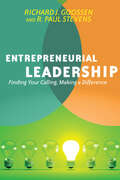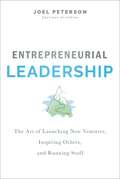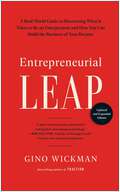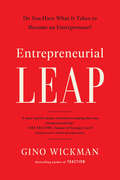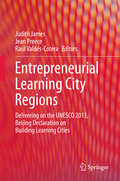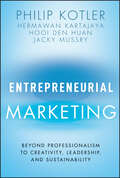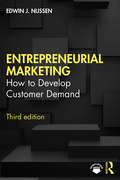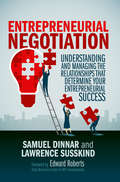- Table View
- List View
Entrepreneurial Innovations, Models, and Implementation Strategies for Industry 4.0 (ISSN)
by Shivani Agarwal Geeta Rana Ravindra SharmaThis book explores the link between entrepreneurship and innovation, providing an understanding of the latest developments in the field. It explores numerous challenges to entrepreneurship, such as failures and socio-economic issues, and presents concepts, models, and implementation strategies for Industry 4.0.Industry 4.0 presents unique challenges and unique opportunities to entrepreneurs. Social, techno, and women’s entrepreneurship, among other business sectors and domains, are discussed in this new context. This book highlights the strategies of successful start-up organizations, focusing on the most critical factors for starting a new enterprise in today’s business environment, and provides efficient remedies for common problems. These strategies and solutions will help build a sustainable development model for developing economies and contribute to a global awareness of the entrepreneurship environment.Entrepreneurial Innovations, Models, and Implementation Strategies for Industry 4.0 is both a practical guide for new entrepreneurs to establishing start-ups and an enlightening collection of research for graduate students, postgraduate students, scholars, and academicians across all disciplines. Policymakers will also benefit from this book’s understanding of entrepreneurial ecosystems and their applications.
Entrepreneurial Knowledge, Technology and the Transformation of Regions: Entrepreneurial Knowledge, Technology And The Transformation Of Regions (Regions and Cities #68)
by Charlie Karlsson Börje Johansson Roger StoughIn recent years, policy makers have given much credence to the role of entrepreneurship in the transformation of regions. As a result, a new set of policy responses have emerged that focus on the support of new venture creation, small business growth and idea generation and commercialization. While there is a wealth of research about entrepreneurship in general, less attention has been given to the development of new tools and programs in support of entrepreneurial activities, and to the ways in which the emergence, the character and the types of entrepreneurship policies might differ between countries. In particular, the transatlantic perspective is of special interest because of the pioneering role of the United States in this area, and also due to the European Union's focus on economic competitiveness. The contributions included in this book explore the emergence of entrepreneurship policies from a transatlantic comparative perspective and address different aspects of entrepreneurship policies including local entrepreneurship policies and the relationship between knowledge-based industries and entrepreneurship policies.
Entrepreneurial Leadership im räumlichen Handlungskontext: Charakterisierung von entrepreneurial Leadern als Akteure in touristisch-sozialen Feldern (Entrepreneurial Management und Standortentwicklung)
by Stefanie HaselwanterAlpine Destinationen sind komplexe Gebilde, die ökonomische und soziokulturelle Strukturen vereinen. Sie sind eng mit der ansässigen Bevölkerung und dem lokalen Unternehmertum verknüpft. Unternehmerische Führungspersönlichkeiten, sogenannte ‚entrepreneurial Leader&‘, spielen eine Schlüsselrolle bei der Destinationsentwicklung. Während ‚Entrepreneurial Leadership&‘ als aufstrebender Forschungszweig vorwiegend auf organisationaler Ebene untersucht wurde, widmet sich dieses Buch der Charakterisierung von entrepreneurial Leadern im räumlichen Kontext alpiner Destinationen. Zur Analyse der Interaktionen von entrepreneurial Leadern werden feldtheoretische Ansätze herangezogen, welche neue Perspektiven auf die Strukturmuster in Destinationen eröffnen. Die Arbeit folgt einem konzeptionellen, explorativen Forschungsdesign und kombiniert methodisch Ansätze der Grounded Theory mit einer integrativen Literaturanalyse. Ziel ist es, entrepreneurial Leadership auf unterschiedlichen Handlungsebenen zu analysieren und ein Modell für entrepreneurial Leadership im touristischen Raum zu entwickeln. Daraus werden zentrale Thesen sowie theoretische und praktische Implikationen abgeleitet.
Entrepreneurial Leadership: A Practical Guide to Generating New Business
by Angelo MastrangeloReal-life examples from the author's experience illuminate a step-by-step plan that can help entrepreneurial leaders achieve their goals. * Suggests easy-to-follow principles for entrepreneurial leaders in all kinds of organizations based on the author's 40+ years of success leading enterprises in the business and nonprofit worlds * Combines principles of entrepreneurship and leadership into two groundbreaking models * Explains the fundamentals of entrepreneurial leadership in clear, readily understandable language * Shows the reader how to identify commercially viable opportunities versus opportunities that may not generate income * Takes readers inside the "Cola Wars" of the 1980s and 1990s, providing a glimpse into an industry that most people regularly patronize but of which they have no insider understanding * Uses real-life examples to show how entrepreneurial leadership has been practiced in unexpected places, including three U. S. presidencies
Entrepreneurial Leadership: Finding Your Calling, Making a Difference
by R. Paul Stevens Richard J. GoossenWhat does good theology have to do with good entrepreneurship? In this pioneering work, Richard Goossen and R. Paul Stevens have written what many are already declaring to be the essential resource for Christian entrepreneurial leadership, based on exhaustive research, practical experience and decades of teaching marketplace theology. Entrepreneurial Leadership addresses both the "how-come" and the "how-to," not only grounding the entrepreneurial calling in its proper source in the triune God but also providing practical guides for how to be an effective leader. Be inspired to find your calling and to make a difference in the marketplace, church and beyond.
Entrepreneurial Leadership: The Art of Launching New Ventures, Inspiring Others, and Running Stuff
by Joel PetersonMake a lasting impact by launching new initiatives, inspiring others, and championing innovative approaches with this from-the-trenches guide by trusted executive mentor, entrepreneur, and leadership expert Joel Peterson. Many leaders see their roles as presiders/managers, with a primary focus on keeping results consistent with past performance and on budget. These kinds of leaders make important contributions but rarely leave a mark on the businesses they serve. For those wanting to make a lasting impact, new skills are required. They need to learn to launch new initiatives, inspire others, and champion innovative approaches. Joel Peterson calls these higher-level leaders &“entrepreneurial leaders,&” and they create durable enterprises that deliver on their promise.After three careers, four decades of marriage and seven kids, and demanding roles as CFO, CEO, chairman, lead director, adjunct professor, founder, author, entrepreneur and investor, Joel Peterson is often sought as a mentor and coach by leaders and aspiring leaders. He has worked with all types of leaders and considers the entrepreneurial leader to be the highest level of influence.Peterson lays out a path to achieving this summit, with a series of leadership maps organized around the four essential basecamps on the path to Entrepreneurial Leadership:Establishing TrustCreating a Sense of MissionBuilding a Cohesive TeamExecuting and Delivering ResultsThese core philosophies, while easy to summarize, can be extremely difficult to implement. As Peterson says:&“This book of maps and mindsets is aimed at those who hope to lead others, help them achieve their best, break new barriers, change the status quo, create a legacy, develop a brand, and enjoy a life-altering experience.&”Let Entrepreneurial Leadership guide you on your journey.
Entrepreneurial Leap, Updated and Expanded Edition: A Real-World Guide to Discovering What It Takes to Be an Entrepreneur and How You Can Build the Business of Your Dreams
by Gino WickmanYou&’ve thought about starting your own business . . . but how can you decide if you should really take the leap? An entrepreneur depends on far more than just a great idea and a generous helping of luck. There&’s a lot on the line, and you have to ask yourself difficult questions: Do I have what it takes? Is it worth it? And how the heck do I do it? You need answers, not BS. This book has them. The updated edition of Entrepreneurial Leap will help you decide, once and for all, if entrepreneurship is right for you—and give you the tools you need to create a successful business. In this three-part book, Gino Wickman, bestselling author of Traction, reveals the 6 essential traits that every entrepreneur needs in order to succeed, based on real-life stories of entrepreneurs who have reached incredible heights. If these traits ring true for you, you&’ll get a glimpse of what your life would look like as an entrepreneur, learn how to avoid 8 critical mistakes, and determine what type of business best suits your unique skill set. What&’s more, Wickman provides a detailed road map to a better start-up, including 8 must do&’s to increase your odds of success, 9 stages of building your business, and 10 disciplines for managing and maximizing your energy. Packed with tools, tips, and exercises that will accelerate your path to start-up success, Entrepreneurial Leap is a simple and practical how-to manual for BIG results. Should you take the leap toward entrepreneurship? Find out today and let tomorrow be the first step in your new journey, whatever shape it may take.
Entrepreneurial Leap: Do You Have What it Takes to Become an Entrepreneur?
by Gino WickmanYou've thought about starting your own business . . . but how can you decide if you should really take the leap? There's a lot on the line, and you have to ask yourself difficult questions: Do I have what it takes? Is it worth it? And how the hell do I do it? You need answers, not bullshit. This book has them. Entrepreneurial Leap: Do You Have What it Takes to Become an Entrepreneur? is an easy-to-use guide that will help you decide, once and for all, if entrepreneurship is right for you—because success as an entrepreneur depends on far more than just a great idea and a generous helping of luck. In this three-part book, Gino Wickman, bestselling author of Traction, reveals the six essential traits that every entrepreneur needs in order to succeed, based on real-world startups that have reached incredible heights. If these traits ring true for you, you'll get a glimpse of what your life would look like as an entrepreneur. What's more, Wickman will help you determine what type of business best suits your unique skill set and provide a detailed roadmap, with tools, tips, and exercises, that will accelerate your path to startup success. Packed with real-life stories and practical advice, Entrepreneurial Leap is a simple how-to manual for BIG results. Should you take the leap toward entrepreneurship? Find out today and let tomorrow be the first step in your new journey, whatever shape it may take.
Entrepreneurial Learning City Regions: Delivering on the UNESCO 2013, Beijing Declaration on Building Learning Cities
by Judith James, Jean Preece and Raúl Valdés-CoteraThis book proposes an alternative strategy to improve and sustain prosperity, through the creation of an entrepreneurial culture in learning cities or city regions. The edited collection provides insights into how entrepreneurship, education, job creation and social inclusion can be aligned through entrepreneurial learning, in the context of territorial development. With rich and varied contributions from a wide field, including policy makers, entrepreneurs, an investment banker, leaders of universities and councils, the voluntary sector, scientists, educators and students, it reviews and assesses how learning cities and regions may become more prosperous by investing in the development of entrepreneurial skills throughout lifelong learning. Reinforced by examples on developing and retaining entrepreneurial people, this book contributes to our understanding of how entrepreneurial learning can be fostered in different city and city-region contexts. It makes an interesting contribution to the field in terms of mapping out complex issues and testing the practical validity of the concept, while also providing rich and insightful case studies centred on the Welsh experience with entrepreneurial learning city regions. The high quality international contributions demonstrate the new worldwide interest in developing an entrepreneurial culture for the benefit of a city or region, rather than an entrepreneurial mind-set for individual benefit. This fascinating subject will be of interest to many social scientists, policymakers, and practitioners. It will be found especially valuable for professionals involved in economic, inclusive and sustainable city or regional development.
Entrepreneurial Learning: Conceptual Frameworks and Applications
by Richard Harrison Claire M. LeitchThis book addresses the burgeoning interest in organizational learning and entrepreneurship, bringing together for the first time a collection of new papers dealing explicitly with entrepreneurial learning. Where past books have examined learning in a corporate context, Harrison and Leitch focus instead on the learning process within entrepreneursh
Entrepreneurial Learning: New Perspectives in Research, Education and Practice (Routledge Studies in Entrepreneurship)
by David Rae Catherine L. WangThis book explores the development of the rapidly evolving field of entrepreneurial learning by bringing together contributions from an international team of researchers, who offer new understanding of its emerging development and its potential scope for the future. Using the three domains of theory, education, and learning-in-practice, this book offers differing and complementary perspectives on entrepreneurial learning: Conceptual work which reviews and summarises prior work in the field and advances theoretical understanding of entrepreneurial learning research, enabling a review of the development of research in this area over time. Applied work around entrepreneurship education which develops understanding of teaching and learning practices in educational and institutional contexts. Exploration of learning in ‘real’ business contexts, including new venture creation, family business and small business development, and ‘intrapreneurial’ learning in larger organisations. Using global perspectives, originating from the different cultural contexts of the USA, UK, Nordic and Chinese perspectives, the chapters converge to address issues, questions and opportunities for the future development of entrepreneurial learning. This book will be of interest to educators and researchers in the areas of entrepreneurship, enterprise education and entrepreneurial development, as well as policy makers and business advice and support agencies.
Entrepreneurial Management
by Shivganesh BhargavaA prerequisite for good entrepreneurial management is an enterprising attitude on the part of the people involved. Productivity of an organization can only be improved with proper management. The influences of family, social institutions, governance and leadership also play a significant role in the management of an organization. Common managerial challenges such as competition, resource scarcity, shortage of power and capital, technology upgradation and cost of production require the attention of policy makers. Creating and developing an entrepreneurial mindset in people, would help an organization face all challenges to enhancing the life of a product in the marketplace. To motivate people and achieve growth, leaders are required to navigate both internal and external conflicts. Consequently, the role of entrepreneurial leadership and management becomes important for students as well as entrepreneurs. All these issues are dealt with in this volume on entrepreneurial management consisting of 14 papers, written by management professionals, faculty, research scholars, consultants and administrators.
Entrepreneurial Management in Small Firms
by Dr Ian ChastonExamining the crucial role of innovation and entrepreneurship in achieving growth and ongoing success in the small business sector, this book carefully examines the processes by which small businesses identify new opportunities, evolve appropriate marketing strategies, develop new products and services and successfully launch these into the market.<P> The text:<P> - Includes a dedicated chapter on social entrepreneurship and family firms<P> - Explores issues of Ethics and Corporate Social Responsibility<P> - Packed with supporting "real world" case studies including Apple's iPod, Facebook, Starbucks and YouTube to illustrate how entrepreneurial firms succeed. <P> - Learning features including learning aims, summaries, points for discussion, and further reading. <P> - Companion website with instructors' manual and PowerPoint slides and access to full-text journal articles for students. <P> Visit the Companion website at www.sagepub.co.uk/chaston
Entrepreneurial Marketing and International New Ventures: Antecedents, Elements and Outcomes (Routledge Studies in Entrepreneurship)
by Izabela KowalikThe book investigates the entrepreneurial marketing (EM) concept within the broader discipline of international entrepreneurship. The analysis of this concept, and designing a model of EM antecedents, elements, and outcomes that was tested on the basis of empirical studies covering companies from three European countries, explores and develops the field of international marketing and entrepreneurship. The book examines the role of entrepreneurial marketing in the internationalization processes of new ventures and adopts both qualitative and quantitative methods for analyzing the antecedents and characteristics of entrepreneurial marketing, as well as their relationships with internationalization activities and firms’ performances. It goes on to show how the application of entrepreneurial marketing may lead to an accelerated internationalization of companies originating from a transition market, as well as the Western-European markets. It addresses these topics with regards to entrepreneurial marketing and management and will be of interest to researchers, academics, managers, entrepreneurs, and students in the fields of international business, international marketing, and entrepreneurship.
Entrepreneurial Marketing for SMEs
by Luca Cacciolatti Soo LeeEntrepreneurial Marketing for SMEs contextualizes the practice of marketing amongst SMEs, and critically discusses major issues of Entrepreneurial Marketing with a relevant and up-to-date academic body of knowledge.
Entrepreneurial Marketing: A Blueprint for Customer Engagement
by Beth L. GoldsteinEntrepreneurial Marketing: A Blueprint for Customer Engagement offers a cutting-edge perspective on how to create a customer-centric, multi-channel marketing program. Emphasizing the role of entrepreneurial marketing in the value-creation process, Entrepreneurial Marketing helps students learn how to view the customer engagement experience through the eyes of their target market to effectively build a sustainable brand. Packed with practical tools, examples, and worksheets, the text allows students to immediately apply what they learn to their new venture idea.
Entrepreneurial Marketing: A Blueprint for Customer Engagement
by Beth L. GoldsteinEntrepreneurial Marketing: A Blueprint for Customer Engagement offers a cutting-edge perspective on how to create a customer-centric, multi-channel marketing program. Emphasizing the role of entrepreneurial marketing in the value-creation process, Entrepreneurial Marketing helps students learn how to view the customer engagement experience through the eyes of their target market to effectively build a sustainable brand. Packed with practical tools, examples, and worksheets, the text allows students to immediately apply what they learn to their new venture idea.
Entrepreneurial Marketing: An Effectual Approach
by Edwin J. NijssenHow do you sell an innovative product to a market that does not yet exist? Entrepreneurial businesses often create products and services based on radically new technology that have the power to change the marketplace. Existing market research data will be largely irrelevant in these cases, making sales and marketing of innovative new products especially challenging to entrepreneurs. Entrepreneurial Marketing focuses on this challenge. Classic core marketing concepts, such as segmentation, positioning and the marketing mix undergo an ‘extreme makeover’ in the context of innovative products hitting the market. Edwin J. Nijssen stresses principles of affordable loss, experimentation and adjustment for emerging opportunities, as well as cooperation with first customers. Containing many marketing examples of successful and cutting edge innovations (including links to websites and videos on the Internet), useful lists of key issues and instructions on how to make a one-page marketing plan, Entrepreneurial Marketing: An Effectual Approach provides a vital guide to successfully developing customer demand and a market for innovative new products. This second edition has been thoroughly expanded with: a one-page marketing plan which now focuses on the three entrepreneurial challenges that can be easily adapted; coverage of the customer development process; and updated references and new examples. This book provides students and entrepreneurs with the fundamental tools to succeed in marketing.
Entrepreneurial Marketing: Beyond Professionalism to Creativity, Leadership, and Sustainability
by Philip Kotler Hermawan Kartajaya Hooi Den Huan Jacky MussryAn eye-opening discussion of the future of marketing, from four of the leading minds in the field In Entrepreneurial Marketing: Beyond Professional Marketing, a renowned team of marketing leaders, including the “Father of Modern Marketing,” Professor Philip Kotler, delivers a groundbreaking and incisive redefinition of entrepreneurial marketing. In the book, some of the marketing sector’s brightest minds explore the increasingly essential initiative to build new capabilities beyond the mainstream marketing approach that also consider the effect of digital connectivity on consumers and companies everywhere. This book also discusses what marketers need to do to break the stagnation of normative marketing approaches that are often no longer effective in dealing with dynamic business environments. The authors introduce a fresh entrepreneurial marketing approach, converging dichotomies into a coherent form. The book also includes: A post-entrepreneurial-marketing view of the commercial landscape which puts the operational aspect at the center of the action, converging marketing and finance, and adopting technology for humanity Discussions of the strategies and techniques that will drive the actions of the marketing departments to create value with values that will lead the company to success through the year 2030 Explorations of the paradox between the development of core competencies and collaboration with various parties, including competitorsThe latest publication from some of the foremost minds in marketing—and in business, generally—Entrepreneurial Marketing: Beyond Professional Marketing is a must-read combination of unique insight, concrete advice, and implementable strategies that introduce a new mindset for every professional marketer, entrepreneur, and business leaders worldwide.
Entrepreneurial Marketing: How to Develop Customer Demand
by Edwin J. NijssenHow do you sell an innovative product to a market that does not yet exist? Entrepreneurial businesses often create products and services based on radically new technology that have the power to change the marketplace. Existing market research data will be largely irrelevant in these cases, making sales and marketing of innovative new products especially challenging to entrepreneurs. Entrepreneurial Marketing focuses on this challenge. Classic core marketing concepts, such as segmentation, positioning, and the marketing mix undergo an ‘extreme makeover’ in the context of innovative products hitting the market. Edwin J. Nijssen stresses principles of affordable loss, experimentation, and adjustment for emerging opportunities, as well as cooperation with first customers. Containing many marketing examples of successful and cutting-edge innovations (including links to websites and videos), useful lists of key issues, and instructions on how to make a one-page marketing plan, Entrepreneurial Marketing provides a vital guide to successfully developing customer demand and a market for innovative new products. This third edition has been thoroughly expanded, including: Expanded content on leveraging digital technologies and their new business models More practical tools, such as coverage of the Lean Canvas model Updated references, cases, and new examples throughout; and, Updated online resources This book equips advanced undergraduate and postgraduate students of marketing strategy, entrepreneurial marketing, and entrepreneurship with the fundamental tools to succeed in marketing.
Entrepreneurial Marketing: Learning from High-Potential Ventures
by Joseph B. LassiterDescribes entrepreneurial marketing as both a mind-set and a process. Draws on some 30 business field cases and some 300 student projects that provide insight into what managers do in high-potential settings.
Entrepreneurial Motivations: Strategies, Opportunities and Decisions (International Studies in Entrepreneurship #57)
by Marco ValeriEntrepreneurship depends on the decisions that people make about how to undertake that process; however, in recent years, entrepreneurship research has focused largely on the environmental characteristics influencing firm founding and the characteristics of entrepreneurial opportunities, ignoring the role of human agency. This book, therefore, focuses on how human motivations influence the entrepreneurial process. It argues that the attributes of people making decisions about the entrepreneurial process influence the decisions that they make. The book particularly investigates whether entrepreneurial role models, social valuation of entrepreneurship, perceived knowledge of entrepreneurial support and barriers to starting a business, entrepreneurial intention, and its determinants are related to entrepreneurial motivation.Featuring case studies that analyze the motivations that researchers have suggested should influence the entrepreneurial process, this book is beneficial to students, scholars, and practitioners in entrepreneurship.
Entrepreneurial Negotiation: Understanding And Managing The Relationships That Determine Your Entrepreneurial Success
by Lawrence Susskind Samuel Dinnar Edward RobertsThe great majority of startups fail, and most entrepreneurs who have succeeded have had to bounce back from serious mistakes. Entrepreneurs fumble key interactions because they don’t know how to handle the negotiation challenges that almost always arise. They mistakenly believe that deals are about money when they are much more complicated than that.This book presents entrepreneurship as a series of interactions between founders, partners, potential partners, investors and others at various stages of the entrepreneurial process - from seed to exit. There are plenty of authors offering ‘tips’ on how to succeed as an entrepreneur, but no one else scrutinizes the negotiation mistakes that successful entrepreneurs talk about with the authors.As Dinnar and Susskind show, learning to handle emotions, manage uncertainty, cope with technical complexity and build long-term relationships are equally or even more important. This book spotlights eight big mistakes that entrepreneurs often make and shows how most can be prevented with some forethought. It includes interviews with high-profile entrepreneurs about their own mistakes. It also covers gender biases, cultural challenges, and when to employ agents to negotiate on your behalf.Aspiring and experienced entrepreneurs should pay attention to the negotiation errors that even the most successful entrepreneurs commonly make.
Entrepreneurial New Venture Skills
by Robert N. Lussier Joel Corman David KimballAs business schools expand their entrepreneurship programs and organizations seek people with entrepreneurial skills, it has become clear that the skills and mindset of an entrepreneur are highly valued in all business contexts. This latest edition of Entrepreneurial New Venture Skills continues to focus on helping students develop entrepreneurial skills, whether they seek to become entrepreneurs or employees. Focusing on the entrepreneurial start-up process, the third edition of Entrepreneurial New Venture Skills takes the reader through the steps of selecting, planning, financing, and controlling the new venture. The authors cover multiple forms of new ventures, as well as ways to utilize entrepreneurial skills in other contexts, encouraging students to engage with the material and apply it to their lives in ways that make sense for them. Skill development features include: Entrepreneurial profiles of small business owners Personal applications for students to apply questions to their new venture or a current business Global and domestic cases Elevator pitch assignments, which put students in the venture capitalist position Application exercises and situations covering specific text concepts Business plan prompts to help students construct a business plan over the course of a semester Featuring pedagogical tools like review questions and learning outcomes, and a full companion website that expands upon skill development and offers instructor resources, the third edition of Entrepreneurial New Venture Skills is the perfect resource for instructors and students of entrepreneurship.
Entrepreneurial Opportunity: The Right Place at the Right Time
by Greg ClydesdaleSuccessfully starting a new business venture depends upon more than having a brilliant idea, getting funding, and getting the product or service to market. Entrepreneurs must also learn to read the market and understand the environments in which they must operate. Entrepreneurial Opportunity places the emphasis on reading and making the most of things that may be beyond the entrepreneur’s control, from defaulting contractors to the opening and closing of business niches. It also considers previously under-considered options, such as "the political entrepreneur." This long over-due text provides a far more realistic view of entrepreneurial opportunity and the importance of the business environment. Yet despite its realist stance, the book is decidedly optimistic, showing readers how markets evolve over time and present opportunities through that evolution. As Clydesdale states, "it’s not always fair out there," but this book captures the excitement of the market and its role in delivering opportunities. Drawing on a broad range of academic research, Entrepreneurial Opportunity is written in a manner that is accessible for students and practitioners, with examples and mini-cases from a variety of industries, including high technology, hospitality, and motion pictures.




